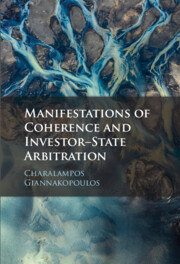Book contents
- Manifestations of Coherence and Investor–State Arbitration
- Manifestations of Coherence and Investor–State Arbitration
- Copyright page
- Contents
- Preface and Acknowledgements
- Table of Cases
- Table of International Conventions
- Table of International Investment Agreements
- Table of Procedural Rules
- Abbreviations
- Introduction
- 1 The Content of Coherence
- 2 Coherence and Legal Reasoning
- 3 Two Models for Coherence
- 4 Coherence and the Interpretation of Treaties
- 5 Coherence and Analogical Reasoning
- 6 Coherence as Reflexivity
- 7 Coherence as Moral Responsibility
- Coda
- Epilogue
- Bibliography
- Index
1 - The Content of Coherence
Published online by Cambridge University Press: 13 December 2022
- Manifestations of Coherence and Investor–State Arbitration
- Manifestations of Coherence and Investor–State Arbitration
- Copyright page
- Contents
- Preface and Acknowledgements
- Table of Cases
- Table of International Conventions
- Table of International Investment Agreements
- Table of Procedural Rules
- Abbreviations
- Introduction
- 1 The Content of Coherence
- 2 Coherence and Legal Reasoning
- 3 Two Models for Coherence
- 4 Coherence and the Interpretation of Treaties
- 5 Coherence and Analogical Reasoning
- 6 Coherence as Reflexivity
- 7 Coherence as Moral Responsibility
- Coda
- Epilogue
- Bibliography
- Index
Summary
The question with which this chapter grapples is the following: What kind of a concept is coherence and what is its content? The chapter begins by a general introduction on concepts. Three different concept types are identified: criterial concepts, natural-kind concepts, and interpretative concepts. As coherence is clearly not a natural-kind concept, the chapter analyses coherence as a potential candidate concept of the criterial kind. It identifies three elements often associated with, and deemed necessary for, the existence of coherence in a legal setting, namely: consistency, correctness, and comprehensiveness. Incidentally, these are also key concerns regarding the existing ISDS regime as expressed by state delegations and scholars. The section ultimately concludes that none of the three elements is necessary for coherence to exist in non-ideal practical situations. Based on this examination, the chapter then shifts perspectives and characterises coherence as a concept of the interpretative kind. In so doing, the chapter makes a preliminary case for the existence of a dual, substantive and methodological, dimension of the interpretative concept of coherence
Keywords
- Type
- Chapter
- Information
- Publisher: Cambridge University PressPrint publication year: 2023



